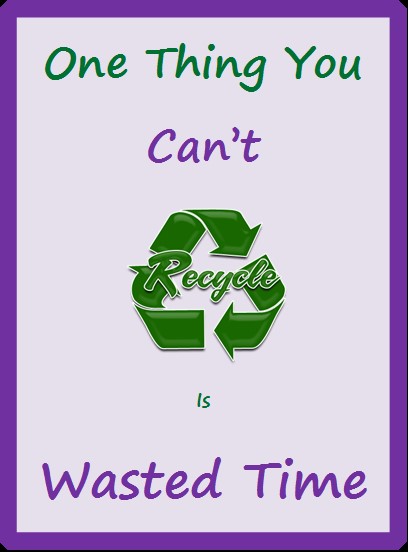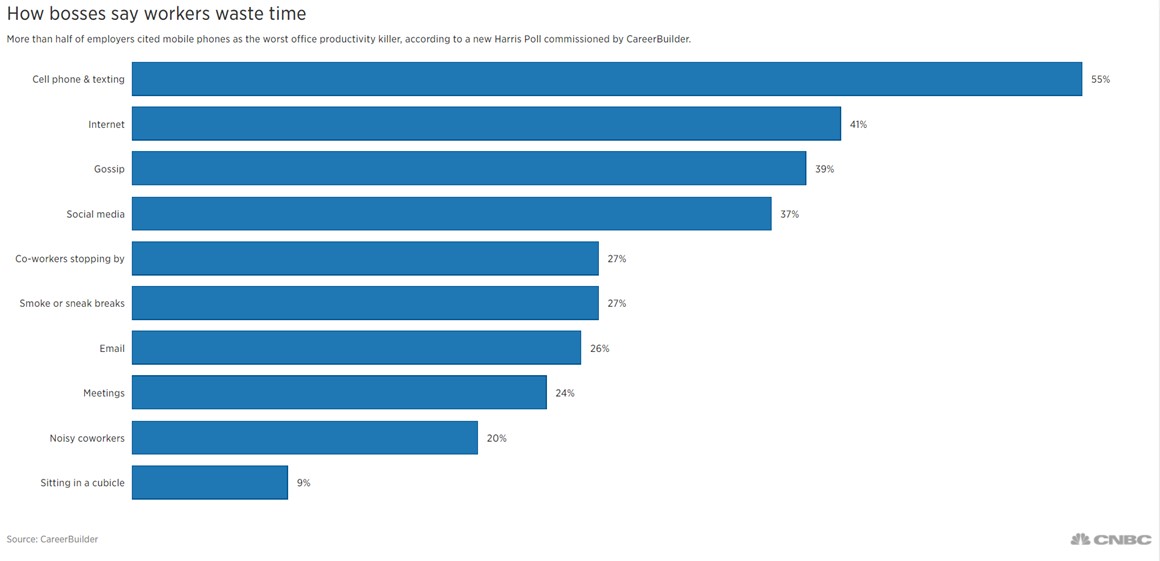Everyone waste time some time. Some more often and more consistently than others. If wasting time is a habit you want to change in order to be more productive to free up time in your day, below are 10 incredibly effective tips to stop wasting time at work and avoid distractions.
But first, what exactly does it mean to waste time?

Is time spent wondering aimlessly or idle time considered wasting time? Time spent doing nothing is not necessarily wasting time. Time spent failing at something is not wasted time. Time spent learning from various situations is not wasting time. Contrary to what many workaholics may think, time spent relaxing or having fun is not wasting time.
Well, wasting time is time doing something else other than what you need to be doing. It is also time spent working inefficiently at something that you are suppose to be doing. Time wasters interferes with performance negatively. Often time, the culprit of wasting time are distractions, unplanned interruptions.
Our days are full of distractions. In order to get the most out of your day and to accomplish your goals, you really have to recognize, manage, and even eliminate the distractions, and by doing so, that will free time, increase productivity, and create a happier workplace environment.
The tricky thing about distractions is that some of them present themselves as opportunities. They are often necessary tasks and are often fun, but the timing of the thing is what makes it a distraction. They are like Mr. Right but not Mr. Right Right Now. People aren’t usually distracted by things that don’t interest them or entice them. Distractions are temptations. Again, they arise at a time when you should be focused on something else.
Wasting Time at Work Statistics:
According to one of some employment statistics provided by Careerbuilder, 75% employers estimate that employees waste at least 2 hours per day. That is a lot of time. Most employers (55%) feel that cell phones are the biggest distractions.

I discovered this interesting stat by workplace productivity expert Marsha Egan, who believes “it takes the average person about four minutes to recover from any interruption.” So the impact to workday productivity is greatly effected by interruptions which could lead to longer hours at work trying to meet deadlines.
The list below outline the common distractions at work. You will see that everything on the list is necessary for performing at work.
- Office email
- Office instant messaging
- Phone calls
- You
- Coworkers (particularly a talkative one)
- Paper
- Environment, Noise
- Personal cellphone
Since it is impossible to eliminate these tools, managing them is the best way to avoid them becoming a distraction. Keep in mind, it is only a true distraction for you if it reduces quality and quantity of your performance at work.
10 Ways to Manage Distractions at Work:
- Develop a routine for handling distractions by scheduling when you will address them. Build distractions in your timelines. The key is to not accept interruptions and schedule as many as you can. Once you identify distraction, make habit of scheduled time to deal with them. Ironically, people are not surprised about what their distractions are , scheduling them in your routine instead of addressing them randomly is the key to productivity.
- Combine distractions with something else already scheduled. Talk to colleague during an exercise break. Have a colleague accompany you while running an errand so you can discuss or brainstorm topics. Catch up on family during your commute home.
- Limit time or avoid the talkative coworker. Schedule time to meet such as 10 minutes before another meeting; that way, you will limit the time because you will have to leave for your next meeting. Plan to meet them during lunch or after work hours. Whatever you do, do not seek out or deal with a talkative person spontaneously.
- Identify how you spend your time. Check out this review of time tracking apps. In addition try this experiment to evaluate how you spend your time.
- Work in chunks of time. Set a timer and focus solely on that task for a dedicated period of time. Typically no more than one hour. So you can pick one task for the hour or two similar thirty minute tasks. You may need to break down big tasks into several one hour tasks. Take an active break at the end of that hour before proceeding to the next task group.
- Use Do Not Disturb setting on instant messaging, personal phones, and hang a sign at desk when you are focusing on a task.
- Ask for deadlines and re-evaluate response times for assignments. You may be responding to emails asap, but it may be ok to respond to certain emails by COB or even the next day. Be certain you know what the deadlines are because you may be able to schedule a them as a chunk and not necessarily handle them as they come in. Heck, there may be tasks you are doing daily that can be cut down to weekly or eliminated all together. Present your case to a manager if change is needed. Remember you want to be able to plan as much as you can and not deal with emails and visitors as they occur.
- Eliminate unnecessary work by utilizing the Important/Urgent matrix for identifying and prioritizing important work tasks. I believe this is probably the one technique that you should master that will have the greatest impact on boosting your productivity.
- Manage emails. Simply do the following to avoid email distractions:
- Remove distracting apps from phone
- Close email when working
- Set a time and timer to check email
- Quit Multitasking. This is a biggie and probably the most controversial distraction. I will not try to convince you whether multitasking is good or bad in this article, but ask you to consider what if multitasking is a distraction. Here is a quick read about multitasking that you can read up on by clicking here. I will suggest that working on multiple tasks simultaneously is not as efficient as devoting attention to one task at a time. Multitasking usually results in poorer quality simply because focus was not there. Every tasks requires your full attention or else you increase the risk of rework or revisiting the matter. The bottom line, try not to make multitasking a habit or your first choice in dealing with a task.
Distractions and interruptions are much like procrastination in that they are productivity killers. Combating and controlling them will lead to life balance and a more enjoyable environment while at work.
I would love to hear about your techniques for dealing with workplace distractions. Please share in comments below.
That was point on! I was just giving myself ‘what for’ for wasting time again. And it was the YOU on your list that was doing that. Letting my mind wander off chasing rainbows or anything but do what I needed to do. Thank you for the wonderful reminder and awesome post.
Hello Merry, it may be helpful to schedule a time slot for daydreaming since that is something that may be a frequent distraction for you. Schedule with a timer is the key. Thanks for commenting.
What a great article on Effective Tips To Stop Wasting Time At Work. I read a book on the subject several months ago and put some of these things into effect. I work at home so there are other distractions as well. I think what makes a big difference is to stop multi-tasking. It is very hard not to answer a call or text or check my email, but practice makes it easier.
You are absolutely right. Dealing with distractions is a daily matter so it helps to have techniques to manage them. Being fully present with the task at hand and not making a habit of multi-tasking definitely helps. Thanks for commenting.
Interesting post I appreciate the tips here! A great technique I use is the pomodoro technique, you work in intervals of 25 minutes so you become extremely focused because you know you only have to focus for 25 minutes and after that you get a 5 minute break then the 25 minute timer continues! It is fantastic for helping you focus and being productive at one thing
Cool. Thanks for the tip!
I love your thought about working in chunks of time. Sometimes when I’m working and it seems endless, I get distracted because I don’t have an end period. But I like the idea of working on it for a dedicated hour, I feel like more would get done that way anyway instead of just aimlessly working on something. Something I try to do but can be bad at is setting deadlines for myself. If a project doesn’t have a deadline it can float in limbo, so when I set deadlines for it, it gets done a lot faster and efficiently. Great article!
Thanks for commenting Kelli. I have worked in project management for most of my career, and deadlines are necessary. I challenge whether something is truly important or urgent by the ability to give it a deadline. You are on the right track by setting deadlines.
This is a biggie for me. I work late into the night, but rarely get things done. Tim Ferris gave good advice about this as well. He notes, that you should never sit down at your computer without a clear and decisive plan about what you’re going to accomplish and how you’re going to get it done.
When you have somewhere to be or want to get done early you always find a way to zone it. We just have to become better at practicing that.
You are right about practice. You know the saying, practice makes perfect. You really have to develop good habits, just a few, to tackle time wasters daily. The more you practice, the more that muscle grows, the more productive you become, and the more things you accomplish by the end of each day. Thanks for commenting.
Wow your site has very good input! Well taught and very nicely detail. I like the graphic about bosses say workers waste time….Thanks Claudette for giving us lots of good information
I hope you found a tip that will help you or you can share with others. Thanks for commenting.